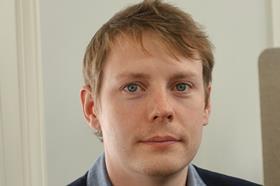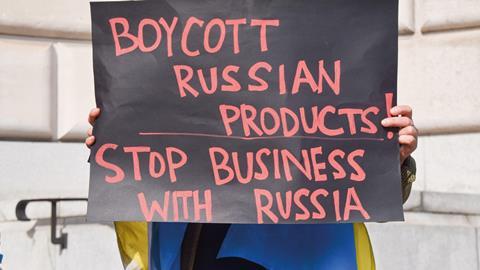Following their hasty retreat from Moscow, law firms at London International Disputes Week learned about the growing importance of the client ‘sniff test’. And about their lawyers’ mental health
Reputation, reputation, reputation. At London International Disputes Week, delegates heard that Russia’s invasion of Ukraine has led to City firms applying a ‘sniff test’ to potential clients. Some also predicted the creation of specialist practices by partners with a large number of Russian clients on their books.


Adam Greaves, a commercial litigation and arbitration practitioner at LK Law, said the ‘sniff test’ is being driven by criticism from politicians and the press, as well as ‘international corporate clients [who] don’t want to attract that sort of attention’.
Speaking on a panel when the conference began on Monday, Greaves said City firms are ‘not really used to acting for people where there is so much smell’, adding that they may do quite a lot of white-collar work but ‘don’t tend to do the harder crime.
‘I suspect there will be movement in the London legal market over the next few months,’ Greaves predicted, ‘with partners leaving or being encouraged to leave depending on how much Russian-related work they did, setting up their own firms or joining firms that don’t have corporate practices [where] they have to worry about institutional clients.
‘I think over time there will be quite a bit of movement of cases from one firm to another and perhaps the creation of firms that specialise in that sort of work.’
Tatiana Minaeva, a specialist in international arbitration and head of former Soviet Union work at RPC, agreed: ‘This lucrative work, which was super-lucrative before [the invasion], is flowing towards smaller law firms, smaller boutique firms, and I am sure that many partners of large firms will start forming their [own] smaller law firms to continue to represent their clients.’
Epaminontas Triantafilou, a partner at Quinn Emanuel Urquhart & Sullivan, also agreed that law firms’ response to the Ukraine invasion was partly driven by clients. ‘I don’t think we should be hiding behind the fact that sanctions are causing the problems, it is also other clients,’ he said. ‘In my experience at least, there are other clients who care very deeply as to whether a firm does Russian work at this point. There are moral objections to that fact.’
Triantafilou added that there are ‘clients who specifically will threaten to suspend or terminate commercial relationships, highly lucrative ones, if the firm continues to do Russia work’.
The event later heard from Law Society president I. Stephanie Boyce, who offered her own more bullish prediction that England and Wales will continue to flourish as a global legal centre of choice for dispute resolution despite fierce competition.
Giving a keynote address, Boyce said competition to be the forum of choice for the resolution of legal disputes had been fierce for several years, with Brexit adding ‘further complexity’. However, she identified ‘absolute certainties’ that made England and Wales a successful jurisdiction.
As well as English remaining the international language for business, Boyce said the benefits of choosing English law have remained unchanged.
‘Based on the principle of freedom of contract, English law allows businesses and individuals to tailor bespoke agreements to fit their specific needs, offering commercial flexibility. Based on the doctrine of precedent, English law also helps commercial parties predict an outcome of a legal dispute with a greater level of certainty. English law is very stable, stretching back hundreds of years and based on well-established principles. English law is transparent, with parties not having to worry that local courts will fetter their ability to exercise contractual rights.
‘Our common law is familiar to the English-speaking nations around the world, from the United States to India, Canada to Hong Kong, Australia to Singapore. It is familiar to those from civil jurisdictions who have used it in their contracts and know it works. English law can also arguably evolve more quickly than statute-based law.’
Boyce praised the judiciary and pointed out that UK judgments ‘are often highly persuasive in courts in other jurisdictions’.
The court system, she said, ‘strikes a balance between ensuring key evidence is available and avoiding disproportionate cost, filters out unmeritorious and weak claims, and allows evidence from foreign jurisdictions in the form of witnesses – or in some cases, documents’.
The president also praised the legal profession, which was strengthened by the presence of foreign lawyers and law firms.
London was often chosen as the seat for arbitration for disputes between parties of different nationalities ‘because it is perceived as a neutral and unbiased forum for these disputes to be heard’.
Another theme at this year’s disputes week was mental health in the profession, a concern that has climbed the managerial agenda partly as a consequence of the pandemic and its aftermath.
Senior legal figures highlighted the toll that dispute resolution work can take on mental health as they tackled the common perception that litigators are ‘incredibly tough’ and ‘hard-nosed’.
Chairing a session on mental health, Simmons & Simmons partner Ed Crosse said the reality was that the job was incredibly tough but this was not reflected in the way lawyers are perceived. Reflecting on his own career, he recalled what he described as ‘symptoms of the stress of the job’ – including sleepless nights and anxiety.
Maryann McMahon, head of litigation (EMEA) at Morgan Stanley, said the main challenge she continued to grapple with is not being a conduit for stress. By the time a matter reaches her, ‘often there is a lot of stress in the system already’, she said. ‘Sometimes I say to my team it’s like being at the end of a long road of dominoes. One of the key things is to try to remain standing, but we are absorbing a lot of stress.’
Former Law Society president Simon Davis said many lawyers are deeply empathetic, highly sensitive to criticism, self-critical and fear failure. ‘You become very adept at taking clients’ troubles and bringing them back to yourself,’ he said. ‘I may have said something to a client along the lines of “You can sleep easy, leave the sleepless nights to me”.’
Being at the ‘sharp end’ in court, barristers often feel responsible for the result, Fountain Court Chambers’ Stuart Ritchie QC said. He recalled a case, involving a receivership application over his client’s business, where he initially struggled to prepare. The case was of ‘exceptional importance’ to his client but Ritchie was ‘getting too tied up’ with the potential consequences.
Anya George, a partner at Schellenberg Wittmer, highlighted the challenges of working without a ‘common rule book’ in arbitration. ‘Deadlines are often set at midnight but midnight where? You might have counsel in Dubai, Singapore.’
Court of Appeal judge Lady Justice Carr said: ‘The buck stops with the judge… You can feel the shift of responsibility from the bar to the bench. Trying to get it right is a huge challenge. I hate that there has to be a loser.’
On practical steps that the profession can take to reduce the pressure, McMahon told audience members to reach out and ask for help. ‘Create an environment where your juniors feel they can do so,’ she added.
George said it was important that people recognise their priorities and check that they are sticking to them to avoid reaching the stage where they are struggling.
‘Be kind to yourself,’ Carr advised. Ritchie said it was important to ‘be yourself’. To those who cause the stress, Davis said it was important they put themselves in the shoes of the person to whom they are speaking.
































No comments yet